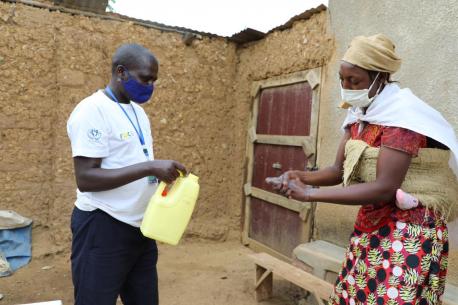
In Rwanda's War on COVID-19, Soap Is a Soldier's Best Weapon
A farmer goes door to door telling his neighbors not to let down their guard and preaching the importance of proper handwashing.
The first African country to receive shipments of the Pfizer COVID-19 vaccine, Rwanda is struggling with three overlapping emergencies: the ongoing COVID-19 pandemic, the risk of Ebola outbreak and providing humanitarian aid to over 145,000 refugees — mainly from Burundi and the Democratic Republic of Congo.
UNICEF is helping the government promote coronavirus prevention methods and mitigate COVID-19's secondary effects on children by providing personal protective equipment (PPE) for community health workers and child protection volunteers. UNICEF and partners are also supporting community mobilizers like Anaclet Musoni, who have helped keep the impact of COVID-19 largely at bay in places like the Mahama neighborhood in Kamombo Village by reminding people not to let down their guard.
When authorities announced schools and places of worship could reopen and public transport resume, many people thought the coronavirus pandemic was at an end, discarding their masks and gathering en masse in markets and other places without maintaining a safe distance.
“We immediately got to work, increasing the number of visits to homes and intensifying awareness-raising, explaining that the virus is still very much with us," says Musoni, who is a farmer by trade. "We cannot afford to reverse the gains we made over the last few months.”

UNICEF community mobilizer Anaclet Musoni shows a neighbor and her children a poster displaying information about how families can protect themselves against COVID-19. © UNICEF/2021/Nzaramba
So far, the campaign is working. Thanks to Musoni and other volunteers' warnings against complacency, Mahama, a village in eastern Rwanda’s Kirehe District, has stayed COVID-free while other areas confronted surges.
“I’ve always wanted to be a soldier, and I sure feel like one now! ” says Musoni, who goes door to door masked and armed with hand sanitizer and a poster about the importance of good hygiene in fighting COVID-19. He spends 20 minutes with each family combatting false information about COVID-19 while demonstrating proper handwashing techniques. “We are in a battle with an invisible enemy, and I am proud to play my part. Together, and with continued support from UNICEF, I am sure we will overcome this virus in the not too distant future!”
You can help UNICEF rush vaccines and critical lifesaving supplies to protect health workers, families and communities in Rwanda and around the world. Please donate today.
Read about how UNICEF is helping fight the brutal spread of COVID-19 in India here.
Top photo: UNICEF-trained community mobilizer Anaclet Musoni shows a neighbor how to properly wash her hands, as part of his door-to-door COVID-19–awareness raising campaign in Kampombo, a village in eastern Rwanda’s Kirehe District. © UNICEF/2021/Nzaramba
HOW TO HELP
There are many ways to make a difference
War, famine, poverty, natural disasters — threats to the world's children keep coming. But UNICEF won't stop working to keep children healthy and safe.
UNICEF works in over 190 countries and territories — more places than any other children's organization. UNICEF has the world's largest humanitarian warehouse and, when disaster strikes, can get supplies almost anywhere within 72 hours. Constantly innovating, always advocating for a better world for children, UNICEF works to ensure that every child can grow up healthy, educated, protected and respected.
Would you like to help give all children the opportunity to reach their full potential? There are many ways to get involved.





